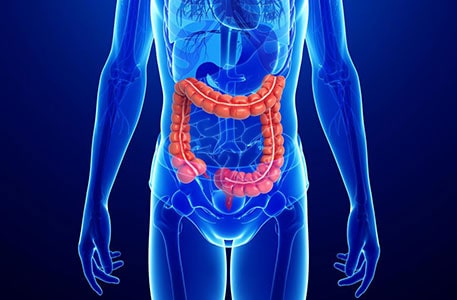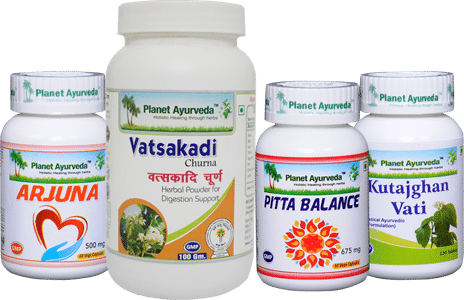How to Treat Crohn’s Disease with Herbal Remedies ?

Crohn’s disease comes under inflammatory bowel disease that causes inflammation of the digestive tract. It may affect your gastrointestinal tract from mouth to anus. Small intestine is mostly affected by this disease. Inflammation caused by this disease spreads deep into the layers of affected bowel tissues. Crohn’s disease sometimes may lead to many other complications.
Many people believe that there is no definitive treatment for Crohn’s disease, but Ayurveda offers powerful and effective herbal solutions. Unlike conventional approaches that often focus only on symptom relief, Ayurvedic treatment addresses the root cause by balancing the body’s doshas and tailoring remedies to an individual’s body type. It utilizes the therapeutic properties of herbs—rasa (taste), guna (qualities), veerya (potency), and vipaka (post-digestive effect)—to promote deep healing and long-term relief.
Let’s Discuss about Signs and Symptoms of Crohn’s Disease
Crohn’s disease mostly affects the small intestine (ileum), the last part of the small intestine and the colon is affected. The signs and symptoms in this disease may vary from mild to severe. When crohn’s disease is active it may include signs and symptoms which are mentioned below:
- Diarrhea
- Fatigue
- Abdominal pain
- Abdominal cramps
- Loss of appetite
- Weight loss
- General weakness
- Fever
- Mucus
- Pain and drainage around the anal region
- Mouth sores
- Blood in stool
Severe Crohn’s Disease may Show a few more Signs and Symptoms
- It may cause inflammation of eyes, skin, and joints.
- In children, it leads to delayed growth or sexual development.
- Sometimes it may cause inflammation of liver and bile ducts.
What are the Causes of Crohn’s Disease?
- Immune system dysfunction – The body attacks its own gut lining.
- Genetics – Family history increases risk.
- Environmental triggers –Poor diet, pollution, Western lifestyle.
- Gut microbiome imbalance –Disrupted gut bacteria can worsen inflammation.
- Smoking – Major risk factor and worsens symptoms.
- Stress – Doesn’t cause Crohn’s, but can trigger flare-ups.
- Excessive production of Pitta dosha in the body leads to this disease.
Now let’s Discuss about Difference Between Crohn’s Disease and Ulcerative Colitis
These both diseases comes under inflammatory bowel disease but there are some differences mentioned below:
| Crohn’s Disease | Ulcerative Colitis |
| 1) The end part of the small intestine is mostly affected. | 1) Entire colon is affected (in the rectum and colon). |
| 2) Inflammation develops in the gastrointestinal tract from mouth to anus. | 2) It is in the large intestine (colon and rectum). |
| 3) Crohn’s disease may appear in patches. | 3) Ulcerative colitis appears in the continuous pattern. |
| 4) It may cover the entire thickness of the bowel wall. | 4) It causes inflammation in the innermost lining of the intestine. |
| 5) Crohn’s disease is not very common. | 5) Ulcerative colitis is a very common disease nowadays. |
What are the Complications of Crohn’s Disease?
Crohn’s disease shows many complications that are mentioned below:
- Ulcers: Ulcers can form anywhere along the digestive tract, from the mouth to the anus.
- Bowel obstruction: This disease affects the thickness of the intestinal wall.
- Fistulas: Fistula may appear near or around the anal region.
- Anal fissure: It is a small tear that lines the anal skin.
- Colon cancer: Sometimes severe conditions of crohn’s disease increases the risk of colon cancer.
- Malnutrition: Diarrhea, abdominal cramps & abdominal pain makes difficult to eat that leads to malnutrition.
- Other health issues: This disease may lead to other problems like anemia, osteoporosis, arthritis, skin disorders, liver and gall bladder disease.
Let’s Discuss the Herbal Remedies for Crohn’s Disease
According to Ayurveda in Crohn’s disease is compared with Grahani disease. In Ayurveda Grahani is the term used for small intestines (ileum and jejunum). Involvement of all three doshas (Vata, Pitta & Kapha) is seen as per the symptoms. The primary cause of Grahani disease is poor digestion, poor appetite, improper and bad eating habits.
Planet Ayurveda offers an effective combination of herbal remedies for the treatment of Crohn’s disease. Since the line of treatment for Crohn’s disease is similar to that of ulcerative colitis. due to the overlap in signs, symptoms, and dosha involvement—we recommend the Ulcerative Colitis Care Pack for patients with Crohn’s as well.
Dosage
- Arjuna Capsules : 2 capsules twice daily with plain water half an hour after meals.
- Vatsakadi Churna : 1 teaspoonful twice daily with plain water half an hour after meal or you can boil the powder – 1 teaspoonful in 400 ml water, keep it boiling until it remains 50 ml. Strain it and drink the water. Leave the residue. Do it twice daily. Make fresh preparation every time.
- Pitta Balance Capsules : 1 capsule twice daily with plain water half an hour after meals.
- Kutaj Ghan Vati : 2 tablets twice daily with plain water half an hour after meals.
Product Description
1. Arjuna Capsules
Arjuna Capsules from Planet Ayurveda are made from a standardized extract of Arjuna (Terminalia arjuna), a powerful Ayurvedic herb known for its healing and rejuvenating effects. With its cold potency and light, dry qualities, Arjuna balances Pitta and Kapha doshas, making it highly beneficial in inflammatory conditions like Crohn’s disease. Its Asrikjit (anti-hemorrhagic) property helps manage internal bleeding caused by intestinal ulcers. Rich in antioxidants such as flavonoids and tannins, Arjuna reduces inflammation and oxidative stress while supporting gut mucosa repair. It also helps improve hemoglobin levels, combats anemia and fatigue, and strengthens the heart and circulatory system, promoting overall vitality and well-being.
2. Vatsakadi Churna
This churna is a powerful blend of carefully selected herbs that help maintain a healthy intestine and digestive system, especially in individuals with Crohn’s disease. It includes Kutaz (Holarrhena antidysenterica), known for its ability to manage dysentery and bowel irregularities; Bilva (Aegle marmelos), which supports healthy digestion and reduces intestinal inflammation; and Saunf (Foeniculum vulgare), which cools the body, stimulates appetite, and enhances overall digestion. Nagarmotha (Cyperus rotundus) contributes anti-inflammatory, analgesic, and antioxidant properties, while Anar (Punica granatum) helps manage bleeding disorders often seen in Crohn’s. Choti Elaichi (Elettaria cardamomum) improves appetite, relieves indigestion, and offers a soothing effect. Lastly, Jaiphal (Myristica fragrans) provides anti-diarrheal, antioxidant, and carminative effects that help relieve key symptoms associated with Crohn’s disease. Together, these herbs work synergistically to support gut health and enhance digestive balance.
- Kutaz (Holarrhena Antidysenterica): This herb treats dysentery problem in crohn’s disease.
- Bilva (Aegle Marmelos): It maintains healthy digestion & reduces inflammation of the intestines.
- Saunf (Foeniculum Vulgare): This herbs give cooling effects on the body, increases appetite and maintains overall digestion.
- Nagarmotha (Cyperus Rotundus): The herb shows anti-inflammatory, analgesic, and anti-oxidant properties.
- Anar (Punica granatum): It treats bleeding disorders in crohn’s patients.
- Choti Elaichi (Elettaria cardamomum): The carminative action of this herb improves digestion, indigestion, and loss of appetite. It provides cooling effects on the body.
- Jaiphal (Myristica fragrans): This herb has anti-diarrhoeal, anti-oxidant, carminative and stimulant properties that deal with symptoms of crohn’s patients.
3. Pitta Balance Capsules
As the name suggests these capsules balances aggravated Pitta dosha in the body. It maintains a healthy digestive system with its natural ingredients. The ingredients used in the preparation of capsules are Praval Pishti (Coral calcium), Akik Pishti (Agate calcium), Jawar mohra pishti (an ayurvedic calcium compound), Kamdudha ras (an ayurvedic calcium compound), Mukta Pishti (Pearl calcium) and Giloy satva (Tinospora cordifolia) that works in synergistic manner on crohn’s disease.
Presence of Pishti’s in these capsules balance all three doshas & Giloy satva in the capsule maintains fever, weakness, and fatigue in crohn’s patients.
4. Kutazghan Vati
Kutaz herb (Holarrhena antidysenterica) is the main ingredient used in the preparation of Kutazghan vati. Due to its cool potency and light, dry nature, this herb supports the overall health of the intestines. These tablets are particularly beneficial in managing diarrhea, poor digestion, fatigue, and weakness commonly associated with Crohn’s disease. By enhancing the body’s natural digestive functions, the tablets help improve digestion holistically and effectively, without causing any side effects.




